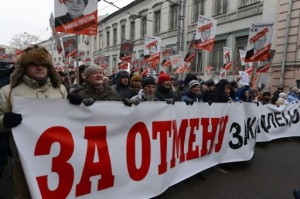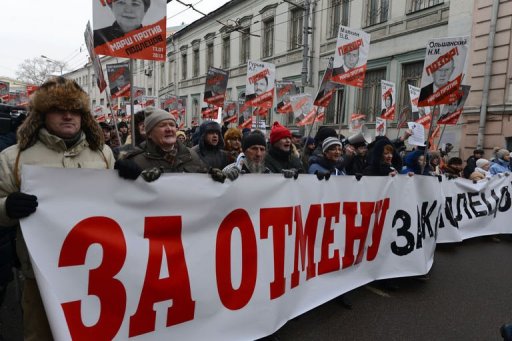
Moscow (AFP) — At least 20,000 Russians marched on Sunday through Moscow to protest a Kremlin law that banned US adoptions of Russian orphans and led to a further split in an already polarised society.
The protest dubbed “the March Against Scoundrels” was aimed at naming and shaming the lawmakers who fast-tracked the anti-adoption bill through the lower house of parliament, the State Duma.
Besides slogans such as “Stop Lying,” participants carried pictures of lawmakers Alina Kabayeva, a former gymnast, and Irina Rodnina, Russia’s Olympic gold figure skating champion, along with others who voted for the measure.
The word “shame!” was splashed across their portraits in red.
The Duma passed the bill without debate in a quick 420-7 vote during a third and final reading in December.
“I am against our Duma and the thieving authorities,” Yulia Shamanova, a young mother, told AFP.
“This is a very shameful law that should be cancelled.”
Moscow authorities said up to 20,000 people could participate in the protest amid a heavy police presence and temperatures of -12°C.
At least 20,000 took part in the march, an AFP photographer said, while leftist activist Sergei Udaltsov said up to 50,000 had turned up.
City police put the turnout at just under 10,000.
“A little goes a long way,” said another march participant Alexei Sharapanyuk. “Sooner or later something will change in the country. It is no longer possible to tolerate this.”
The latest anti-Kremlin march comes after President Vladimir Putin signed off on a measure that introduced a blanket ban on US adoptions in reprisal for Washington legislation targeting Russian officials who have allegedly committed rights abuses.
Critics say the measure will rob many disabled orphans of the chance to receive adequate medical treatment abroad and triggered a rare split in the government.
Scores of Russians had said they planned to join the march for the first time since unprecedented protests against Putin’s 13-year rule first shook Moscow in response to widespread fraud during parliamentary elections in December 2011.
Since then the protests, which at their height gathered up to 120,000 near the Kremlin have died down, with Putin launching a tough crackdown on civil society following his presidential comeback in May.
Eldar Ryazanov, one of the country’s best-loved film directors, had before the march called on Russians to stand up for their rights and those of the orphans.
“It is not possible to live like that. There’s a feeling that we are sinking into the epoch of the Inquisition,” the 85-year-old director said in video appeal posted on the Internet, referring to a string of repressive laws adopted since Putin’s comeback.
Political activists have taken up the cause of Russian orphans to also make a broader point about widespread rights violations and will call for the Duma’s dissolution.
They hope public anger may help breathe new life into the protest movement.
Liberal party Yabloko, which did not make it into the Duma during 2011 elections and often keeps distance from the motley opposition movement that includes nationalists said it would join the march to protest the “barbarian law.”
More than 100,000 signatures have already been collected against the measure and the Novaya Gazeta opposition newspaper has also collected more than 117,000 signatures on a petition calling for the dissolution of parliament.
Observers say the latest Kremlin initiative has led to a huge split in society and dented the government’s moral authority.
Andrei Isayev, chairman of the Duma committee responsible for labour, social policies and veterans’ affairs, branded those planning to take to the streets “enemies” of Russia.
Smaller rallies took place in other cities. Around 1,500 gathered in Saint Petersburg, Putin’s hometown, with some holding placards reading “Putin is evil.”

